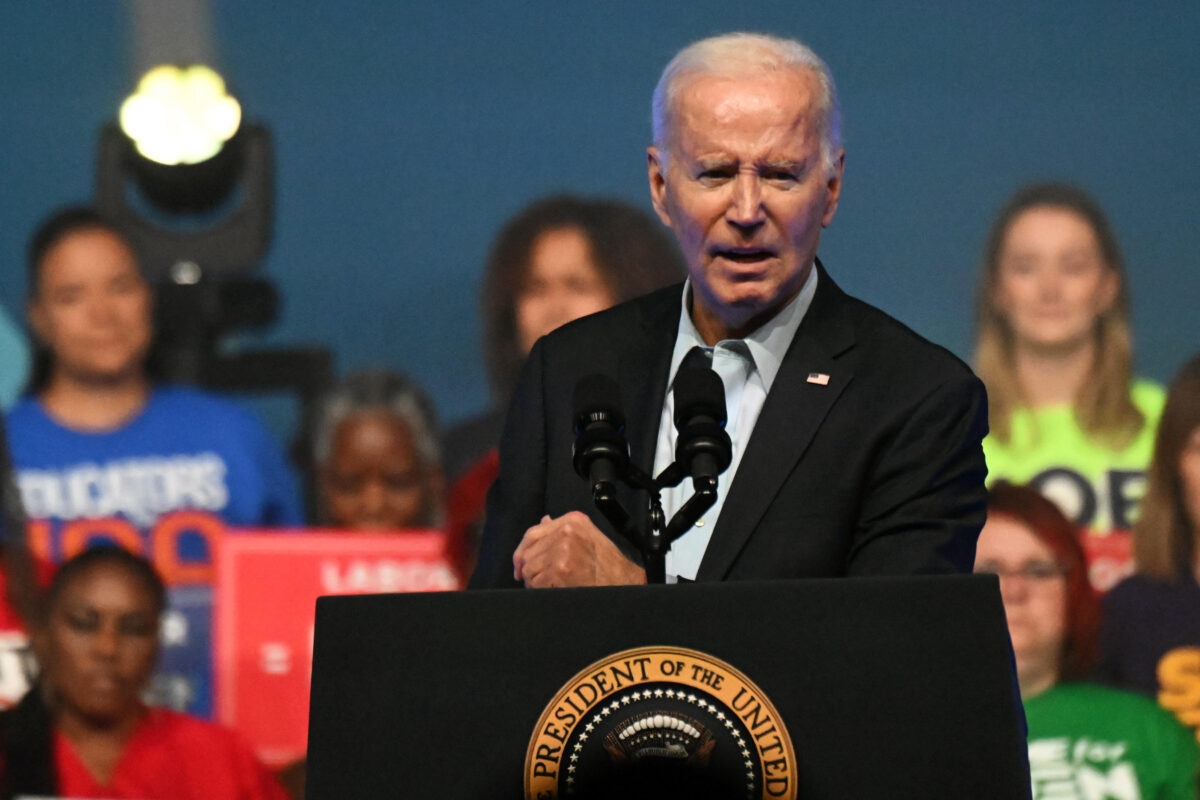


President Joe Biden will mark the first anniversary of the Supreme Court’s historic overturn of Roe v. Wade by attending a pro-abortion rally in Washington, the White House announced earlier this week.
Biden is expected to speak at the June 23 rally, just one of several pro-abortion events the White House has planned to observe the date.
Earlier this week, First Lady Jill Biden held a roundtable discussion with women who were denied abortions and Vice President Kamala Harris appeared in an hour-long MSNBC special highlighting the impacts of the Dobbs decision.
On June 24, the anniversary, Harris will travel to Charlotte, North Carolina, where she will give a speech on abortion. Her remarks will likely include criticism of the state’s new 12-week abortion ban, which became law last month after the Republican-controlled legislature overrode a veto from Democratic Gov. Roy Cooper.
Prior to the high court’s June 24, 2022, ruling in Dobbs v. Jackson Women’s Health Organization, the passage of such laws was often viewed as moot. Under the judicial precedent set by Roe, women had a legal right to abortion—at least until the point of viability—and challenges to laws that said otherwise were all but certain.
However, in Dobbs, the court found that no such right exists under the U.S. Constitution, restoring the ability of the states to regulate abortion as they see fit.
And that’s a power they have taken full advantage of. While some states have pushed for tighter restrictions on abortion, others have rushed to do the opposite, codifying additional protections for women seeking them.
All the while, the Biden administration has been clear about where it stands on the matter.
“Freedom is really under siege, particularly freedom of choice: the right of a woman to choose, the right of a woman to determine what—between she and her doctor—what she needs in her body. And now they’re going after contraception,” the president told supporters at a campaign event on June 20.
“I insist that we’re going to pass legislation in a majority of the states reinstating Roe v. Wade,” he added. “That’s the only way we can get back these rights. And it’s going to happen.”
In lockstep with the administration’s messaging, congressional Democrats marked the Dobbs anniversary in their own way throughout the week.
On June 21, Senate Democrats requested unanimous consent on four bills related to abortion and reproductive health care. Altogether, the bills aimed to enshrine a right to use birth control and contraception, ensure women can legally travel across state lines for abortions, shield abortion providers from liability for abortions performed on women from other states, and protect people’s online health and location data to prevent it being used against them.
At a press conference prior to the votes, Sen. Patty Murray (D-Wash.) decried the “dystopian reality” of post-Roe America, in which she said women are “forced to stay pregnant against their will.”
Democrats, she said, “believe women should make their own health care decisions. It should not be decided by state legislators, state courts, or the U.S. court. That should be a fundamental right of American women.”
Nonetheless, the votes were ultimately symbolic. Under unanimous consent, just one senator can block a bill’s passage, and as was expected, Republicans shot down each bill put forward.
In a statement following the votes, Senate Majority Leader Chuck Schumer (D-N.Y.) said he and his fellow Democrats would “fight like hell” to increase access to abortion and contraception nationwide.
“Nearly one year ago, the right-wing activist Supreme Court handed down the Dobbs decision and signaled to the women across this country that their right to privacy, to health care, and to their own autonomy could now be violated,” Schumer said. “MAGA Republicans have made it clear that they will not stop with their vicious anti-choice agenda until there is a nationwide abortion ban. This issue is too pressing to ignore.”
Meanwhile, in the House, Democrats collected signatures for a discharge petition in an attempt to force a vote on the Women’s Health Protection Act, a bill that would prohibit government restrictions on abortion.
For that move to work, Democrats would need the support of 218 members—a majority of the House. As of press time, they were eight signatures short.
The Democrats’ somber remarks stood in stark contrast to the celebratory tone struck by their Republican colleagues this week.
At a June 20 news conference held outside of the Capitol, Sen. James Lankford (R-Okla.) estimated that around 200,000 children had been born in the past year that likely would have been aborted if not for the Supreme Court’s ruling.
“That’s 200,000 families that will be blessed with looking in the eyes of a child, saying that every single child is valuable,” Lankford said. “So, for us, we’re celebrating the Dobbs decision, and we’re celebrating the option … [being] turned back to the American people—where it was before—to be able to make the decision about the value of every single child.”
Sen. Roger Marshall (R-Kan.), a doctor, said his decades of experience delivering babies had afforded him insight into when life officially begins.
“Tell a woman who’s had three miscarriages, or four miscarriages, and can’t carry a pregnancy—tell her that life doesn’t begin at conception,” Marshall said. “Talk to an infertile couple who spent years and a fortune trying to conceive, and when they finally do conceive, tell them that life doesn’t begin at conception.”
Adding that he believes in the “miracle of life,” Marshall said it was incumbent upon elected officials to “be a voice for the voiceless, to honor the sanctity of life, and fight to protect the lives of the millions of unborn babies.”
